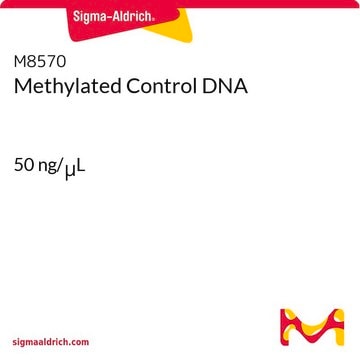20-157
TE Buffer - for use in ChIP Assays
For use in Chromatin Immunoprecipitation assays.
Sign Into View Organizational & Contract Pricing
All Photos(1)
About This Item
UNSPSC Code:
41116012
eCl@ss:
32160405
NACRES:
NA.41
Recommended Products
Related Categories
Application
For use in Chromatin Immunoprecipitation assays.
Research Category
All
All
Physical form
10mM Tris-HCl, pH 8.0, 1mM EDTA
Storage and Stability
1 year at 4°C
Legal Information
UPSTATE is a registered trademark of Merck KGaA, Darmstadt, Germany
Disclaimer
Unless otherwise stated in our catalog or other company documentation accompanying the product(s), our products are intended for research use only and are not to be used for any other purpose, which includes but is not limited to, unauthorized commercial uses, in vitro diagnostic uses, ex vivo or in vivo therapeutic uses or any type of consumption or application to humans or animals.
Storage Class Code
12 - Non Combustible Liquids
WGK
nwg
Flash Point(F)
Not applicable
Flash Point(C)
Not applicable
Certificates of Analysis (COA)
Search for Certificates of Analysis (COA) by entering the products Lot/Batch Number. Lot and Batch Numbers can be found on a product’s label following the words ‘Lot’ or ‘Batch’.
Already Own This Product?
Find documentation for the products that you have recently purchased in the Document Library.
Haiyan Lei et al.
Development (Cambridge, England), 136(8), 1241-1249 (2009-03-06)
Previous work in C. elegans has shown that posterior embryonic bodywall muscle lineages are regulated through a genetically defined transcriptional cascade that includes PAL-1/Caudal-mediated activation of muscle-specific transcription factors, including HLH-1/MRF and UNC-120/SRF, which together orchestrate specification and differentiation. Using
Liang Xu et al.
Cancer letters, 482, 74-89 (2020-04-20)
Distant metastasis is the major cause of short survival in ccRCC patients. However, the development of effective therapies for metastatic ccRCC is limited. Herein, we reported that ETV4 was selected from among 150 relevant genes with in vivo evidence of
Yu-Hui Li et al.
Frontiers in oncology, 10, 567-567 (2020-05-22)
Global incidence and mortality associated with hepatocellular carcinoma (HCC) is steadily increasing. Metastasis-associated 1 (MTA1) can induce tumorigenesis and metastatic progression in HCC. However, the mechanistic details of MTA1-mediated regulation of HCC has not been completely defined. Epigenetic histone modification
Our team of scientists has experience in all areas of research including Life Science, Material Science, Chemical Synthesis, Chromatography, Analytical and many others.
Contact Technical Service







